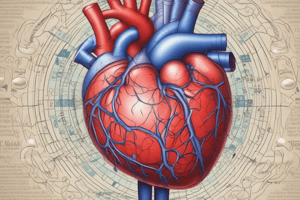Podcast
Questions and Answers
The science dealing with the nature, effects, uses, and origin of drugs is called:
The science dealing with the nature, effects, uses, and origin of drugs is called:
- Pharmacokinetics
- Pharmacodynamics
- Pharmacology (correct)
- Endocrinology
A drug agent that promotes bowel evacuation is a(n):
A drug agent that promotes bowel evacuation is a(n):
- Parenteral
- Enteric
- Enlax
- Laxative (correct)
When you ask the pharmacist for the drug Benadryl, you are asking for the drug using the drug's _____ name:
When you ask the pharmacist for the drug Benadryl, you are asking for the drug using the drug's _____ name:
- Kinematic
- Generic
- Chemical
- Brand (correct)
Any characteristic that makes a drug undesirable or improper is its:
Any characteristic that makes a drug undesirable or improper is its:
Nonprescription drugs are also known as:
Nonprescription drugs are also known as:
Common dosage forms of drugs include:
Common dosage forms of drugs include:
Vitamins, herbals and dietary supplements are classified as:
Vitamins, herbals and dietary supplements are classified as:
Heart attack patients often take a small tablet of nitroglycerine and put it in their mouth, under their tongue, for quick action. This route of administration is:
Heart attack patients often take a small tablet of nitroglycerine and put it in their mouth, under their tongue, for quick action. This route of administration is:
All of the following describe pharmacokinetics EXCEPT:
All of the following describe pharmacokinetics EXCEPT:
All of the following are related EXCEPT:
All of the following are related EXCEPT:
Flashcards are hidden until you start studying
Study Notes
Pharmacology Basics
- Pharmacology is the study of drugs' nature, effects, uses, and origin.
- Key terms in pharmacology include pharmacokinetics (drug absorption, distribution, metabolism, excretion) and pharmacodynamics (drug effects on the body).
Drug Types and Functions
- Laxatives are drugs that promote bowel evacuation, helping relieve constipation.
- Nonprescription drugs are commonly referred to as over-the-counter (OTC) drugs, available without a prescription.
Drug Naming
- The brand name is the commercial name given to a drug, such as Benadryl, which differentiates it from its generic name.
Drug Characteristics
- Contraindications are characteristics that make a drug undesirable or improper for patient use.
- Common dosage forms include suspensions, capsules, tablets, inhalants, and solutions.
Supplements and Vitamins
- Vitamins, herbals, and dietary supplements fall under the category of over-the-counter drugs, as they don't require a prescription.
Administration Routes
- Sublingual administration involves placing a drug under the tongue for rapid absorption; nitroglycerine is an example used for heart attacks.
- Other routes include oral, topical, and parenteral (injection) methods, with intravenous, intramuscular, and subcutaneous being specific injection types.
Pharmacokinetics Focus
- Pharmacokinetics encompasses the processes of absorption, metabolism, and excretion of drugs.
- Filtration is not considered part of pharmacokinetics.
Injection Types
- Intragluteal is not a recognized method compared to subcutaneous, intramuscular, and intravenous injections, which are standard routes for drug administration.
Studying That Suits You
Use AI to generate personalized quizzes and flashcards to suit your learning preferences.




